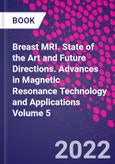Breast MRI: State of the Art and Future Directions provides a comprehensive overview of the current applications of breast MRI, including abbreviated MRI, as well as presenting technical recommendations, practical implementation and associated challenges in clinical routine. In addition, the book introduces novel MRI techniques, multimodality imaging, and advanced image processing coupled with AI, reviewing their potential for impeding and future clinical implementation. This book is a complete reference on state-of-the-art breast MRI methods suitable for MRI researchers, radiographers and clinicians.
Breast cancer is one of the leading causes of death among women with early detection being the key to improved prognosis and survival. Magnetic resonance imaging (MRI) of the breast is undisputedly the most sensitive imaging method to detect cancer, with a higher detection rate than mammography, digital breast tomosynthesis, and ultrasound.
Please Note: This is an On Demand product, delivery may take up to 11 working days after payment has been received.
Table of Contents
Section 1. Performance and Interpretation of Breast MRI
1. Breast Magnetic Resonance Imaging Protocols
i.Abbreviated and Ultrafast MRI
ii.Multiparametric MRI in clinical practice
2. Artifacts
3. BI-RADS
4. The Kaiser score: an evidence-based clinical decision rule for dynamic contrast-enhanced breast MRI
5. Background parenchymal enhancement
Section 2. MRI Characteristics of Common Breast Lesions
6. Benign
7. High-risk
8. DCIS
9. Invasive cancers
Section 3. Clinical Indications for Breast MRI
10. Screening
11. Staging and treatment planning
12. Response assessment to neoadjuvant therapy
13. Follow-up: Posttreatment changes and Recurrent Breast Cancer
14. Breast Augmentation and Post-mastectomy Autologous Breast Reconstruction
15. Problem Solving
16. Cancer of Unknown Primary including Imaging of the Axilla
Section 4: Breast Magnetic Resonance Imaging-guided Interventions and Therapy
17. Biopsy including MRI-directed US and rad-path correlation
18. Monitoring Therapy
Future Directons
Section 5. Advanced and Emerging Approaches
19. Non-contrast MRI
20. Ultra-high field magnets
21. Pharmacokinetic modelling
22. Diffusion MRI of the breast: standard and advanced techniques
23. Proton Magnetic Resonance Spectroscopy
24. Emerging MRI Techniques: CEST, BOLD, Sodium, Phospohorus MRS, Lipid MRS, HP MRI
Section 6: Hybrid Imaging and Alternative Techniques
25. PET/MRI hybrid imaging and targeted tracers
26. Alternative techniques: CEM and MBI
Section 7: Prognostic and Predictive MR imaging biomarkers
27. MRI Radiomics and Radiogenomics for Breast Cancer
28. Artificial Intelligence and Deep Learning








